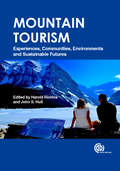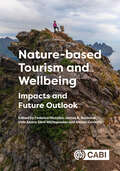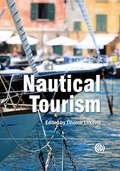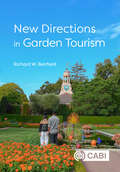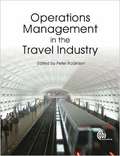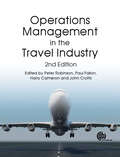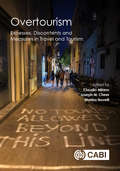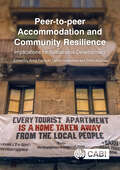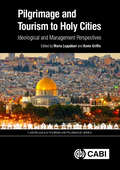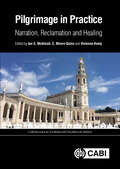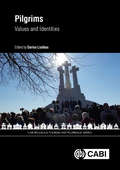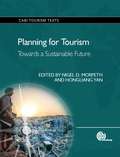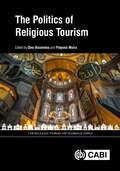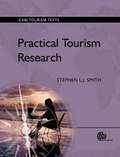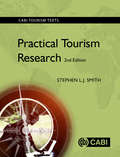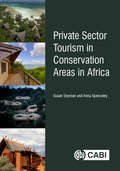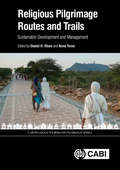- Table View
- List View
Mountain Tourism: Experiences, Communities, Environments and Sustainable Futures
by Harold Richins Aurelia Kogler John Hull Marit Engeset Joel Schmidt Senija Causevic Michael Hall Farhad Moghimehfar Umberto Martini Baikuntha Acharya Simon Milne Anne Terwiel Tracey J Dickson Kathleen Scherf Emmanuelle George-Marcelpoil Sydney Johnsen Michael Volgger Billy Colins Elizabeth Halpenny Peet van der Merwe Axel Dreyer Anita Zehrer Robin Reid Sanjay Nepal Lluis Prats Robert Hood Dr Michael Lück Peter Williams Thorvardur AransonMountains have long held an appeal for people around the world. This book focusses on the diversity of perspectives, interaction and role of tourism within these areas. Providing a vital update to the current literature, it considers the interdisciplinary context of communities, the creation of mountain tourism experiences and the impacts tourism has on these environments. Including authors from Europe, Asia-Pacific and North America, the development, planning and governance issues are also covered.
Mountain Tourism: Experiences, Communities, Environments and Sustainable Futures
by Senija Causevic Joel Schmidt Elizabeth Halpenny Umberto Martini Sanjay Nepal Kathleen Scherf Tracey J Dickson Anne Terwiel Marit Engeset Sydney Johnsen Michael Volgger Dr Michael Lück Thorvardur Aranson Axel Dreyer Robin Reid Michael Hall Baikuntha Acharya Robert Hood Emmanuelle George Simon Milne Farhad Moghimehfar Lluis Prats Peet van der Merwe Billy Colins Peter Williams Aurelia Kogler Anita ZehrerMountains have long held an appeal for people around the world. This book focusses on the diversity of perspectives, interaction and role of tourism within these areas. Providing a vital update to the current literature, it considers the interdisciplinary context of communities, the creation of mountain tourism experiences and the impacts tourism has on these environments. Including authors from Europe, Asia-Pacific and North America, the development, planning and governance issues are also covered.
Nature-based Tourism and Wellbeing: Impacts and Future Outlook
by Federico Niccolini, James R. Barborak, Iride Azara, Eleni Michopoulou and Alessio CavicchiAll around the world, as growing numbers of tourists and recreational visitors flock to protected and other natural areas stimulated by a renewed search for physical, mental, and even spiritual health and wellbeing, different practices and behaviours emerge. This book brings together experiences and perspectives from many countries around the world. On the demand side, the experiences are united by the desire of tourists to find a real and regenerating connection in nature. On the supply side, designing and managing tourist systems that preserve natural capital in good condition requires great professionalism to dynamically maintain a fragile and delicate balance between tourists, local communities, and nature. By understanding the attitudes and emerging norms of behaviour within the context of nature-based tourism, we can begin to sketch a roadmap to enable more holistic, enjoyable, healthy and responsible visitor experiences; facilitate ecosystem conservation; contribute to the mental and physical wellbeing of tourists and outdoor recreationists; and build sustainable economies and resilient destinations and livelihoods. This book is of great relevance for academic researchers, advanced tourism and conservation students, and practitioners working in nature-based tourism and conservation, especially those with a focus on natural destinations, as well as those interested in consumer behaviour, business and management, recreation, and sustainable tourism development.
Nautical Tourism
by Tihomir LukovicNautical tourism encompasses aspects of marine tourism such as sailing, yachting, cruising and diving, as well as harbour-side developments, coastal water sports such as jet skiing, boat shows, port tours, and marine heritage destinations. Nautical tourism as an industry has been developing rapidly in scope and economic status and continues to do so. This book provides a timely analysis of nautical tourism in Europe, examining the provision and expansion of nautical tourism in economies at different stages of development. The book also covers nautical tourism in The Pacific, providing an analysis of two very different markets, and addresses the perceived North American take-over of cruising in Europe to provide insight into the global issues affecting nautical tourism. The book covers matters of current concern such as the role of nautical tourism in economic growth, sustainable development, international policy, consumer demand and the world market, development strategies, arctic tourism and the future potential of nautical tourism. Written by an international team of contributors the book also includes fascinating case studies to further explain and explore current concepts in nautical tourism.
Nautical Tourism
by Tihomir LukovićNautical tourism encompasses aspects of marine tourism such as sailing, yachting, cruising and diving, as well as harbour-side developments, coastal water sports such as jet skiing, boat shows, port tours, and marine heritage destinations. Nautical tourism as an industry has been developing rapidly in scope and economic status and continues to do so. This book provides a timely analysis of nautical tourism in Europe, examining the provision and expansion of nautical tourism in economies at different stages of development. The book also covers nautical tourism in The Pacific, providing an analysis of two very different markets, and addresses the perceived North American take-over of cruising in Europe to provide insight into the global issues affecting nautical tourism. The book covers matters of current concern such as the role of nautical tourism in economic growth, sustainable development, international policy, consumer demand and the world market, development strategies, arctic tourism and the future potential of nautical tourism. Written by an international team of contributors the book also includes fascinating case studies to further explain and explore current concepts in nautical tourism.
New Directions in Garden Tourism
by Richard W BenfieldFollowing on from the success of Garden Tourism this latest offering New Directions in Garden Tourism provides an update on the statistics and growth of the global phenomenon of garden visitation. It delves in to new themes and contemporary trends, from art and culture, to psychographic profiling of visitors and how social media and semiotics are used to enrich visitor experience and fuel motivation. In addition to new topics, the book also provides expansion of chapters previously touched upon in Garden Tourism such as the continued rise in urban gardens, events, and garden economics. · Update on visitor statistics · New case studies throughout · Full colour images This new book provides a wealth of information for garden managers and tourism students. It is written in an engaging-style that will also appeal to casual readers interested in gardens.
Operations Management in the Travel Industry
by Peter RobinsonOperations Management in the Travel Industry provides a broad, in-depth coverage of the knowledge and skills necessary for effective and successful management, including finance, marketing, individual and corporate social responsibility, meeting customer expectations and managing, motivating and retaining employees. Using both theory and real world case studies, it describes the commercial realities of the sector in relation to decision making and business outcomes, with practical consideration given to balancing the needs of a commercial business to drive forward innovation and increase profitability for investors. This book is the prescribed text for the Foundation Degree in Travel Operations Management, and will also be useful to industry practitioners and students in a range of related courses at all levels.
Operations Management in the Travel Industry
by Crispin Dale Steve Gelder Sine Heitmann Ade Oriade Whyeda Gill Mclure Ghislaine Povey Samantha Prior Christine Roberts Debra Wale Caroline WiscombeCovering the applied managerial perspective of the travel industry, this book looks at the core disciplines and the application of theory to practice. Considering individual and corporate social responsibility, it teaches effective managerial skills by reviewing legal frameworks, quality management and marketing, financial management, and the management of shareholders and stakeholders. It discusses current trends such as sustainability and governmental emission targets against a background of the needs of a commercial business to innovate and increase profits. A valuable tool for both students and those working in the travel industry, this new edition includes new content, a revised structure and all-new international case studies.
Operations Management in the Travel Industry, 2nd Edition
by Ghislaine Povey Crispin Dale Paul Fallon Christine Roberts Harry Cameron Samantha Prior John C Crotts Caroline Wiscombe Steve Gelder Whyeda Gill Mclure Peter Robinson Debra Wale Ade Oriade Sine HeitmannCovering the applied managerial perspective of the travel industry, this book looks at the core disciplines and the application of theory to practice. Considering individual and corporate social responsibility, it teaches effective managerial skills by reviewing legal frameworks, quality management and marketing, financial management, and the management of shareholders and stakeholders. It discusses current trends such as sustainability and governmental emission targets against a background of the needs of a commercial business to innovate and increase profits. A valuable tool for both students and those working in the travel industry, this new edition includes new content, a revised structure and all-new international case studies.
Overtourism: Excesses, Discontents and Measures in Travel and Tourism
by Daisuke Abe Dario Bertocchi Macià Blázquez-Salom Antonia Canosa Ernest Cañada Carlos Costa Margarida Ferreira Silva Roos Gerritsma Judy Kepher-Gona Anne Graham Jaume Gual-Carbonell Dimitri Ioannides Gunnar Thór Jóhannesson Jon Kohl Professor Katrín Anna Lund Ivan Murray Mathias Pecot Carla Ricaurte-Quijano Asunción Blanco-Romero Ivana Stevic Medéia Veríssimo Neiva Vieira Cunha Francesco Visentin Erica WilsonThis book examines the evolution of the phenomenon and explores the genesis of overtourism and the system dynamics underlining it. The 'overtourism' phenomenon is defined as the excessive growth of visitors leading to overcrowding and the consequential suffering of residents, due to temporary and often seasonal tourism peaks, that lead to permanent changes in lifestyles, amenities and well- being. Enormous tensions in overtourism affected destinations have driven the intensification of policy making and scholarly attention toward seeking antidotes to an issue that is considered paradoxical and problematic. Moving beyond the 'top 10 things you can do about overtourism', this book examines the evolution of the phenomenon and explores the genesis of overtourism as well as the system dynamics underpinning it. With a rigorous scientific approach, the book uses systems-thinking and contemporary paradigms around sustainable development, resilience planning and degrowth; while considering global economic, socio-political, environmental discourses. This book: - Deconstructs 'overtourism' and considers the many constituent parts that have led to its current conceptualisations; - Presents globally diverse views of overtourism through numerous case studies; - Is written in plain language accessible to readers beyond the academic context. Researchers, analysts, policy makers and industry stakeholders working within tourism as well as those within the private sector, community groups, civil society groups and NGOs will find this book an essential source of information.
Peer-to-peer Accommodation and Community Resilience: Implications for Sustainable Development
by Bailey Ashton Adie David Albarran Maria del Alonso-Almeida Alberto Amore Katerina Antoniou Cecilia De Bernardi Fani Efthymiadou Olga Gjerald Szilvia Gyimóthy Chiga Hayakawa Brian Jones Antonios Kaniadakis Christoph Lutz Filip Majetic Ingeborg Matecic Javier Macías Mendoza Cristina Miguel Jeroen A. Oskam Rodrigo Perez-Vega Michael Röslmaier Antonio Paolo Russo Dimitrios Stergiou Helena Tolic Jinghua XieThe growth of peer-to-peer (P2P) accommodation has been remarkable. However, the rapid expansion of the phenomenon has yielded several concerns over its potentially negative economic, social and environmental impacts. These impacts are highlighted in policy agendas as an emerging problem encountered by many local communities in destinations experiencing a boom in P2P accommodation. Specifically, concerns have been raised over the impact of the growth of P2P accommodation on local housing markets, residents' well-being and the environment as a result of the touristification of residential areas. In fact, many observers accuse P2P accommodation of fuelling the 'overtourism' problem that several destinations face. This edited book addresses the need to examine the P2P accommodation phenomenon from a community resilience lens. In particular, through a collection of chapters presenting a range of empirical and conceptual perspectives from urban and rural communities, the book considers the implications of P2P accommodation growth on the resilience of local communities and the sustainable development of places. This book highlights: · The rapid growth of P2P accommodation yields economic, social and environmental negative impacts on destinations. · The P2P accommodation sector is evolving towards professionalization which, in turns, creates further implications for local community resilience. · This book draws attention towards the need to examine the nexus between P2P accommodation, sustainability and local community resilience. · The collection of chapters presents empirical and conceptual perspectives from urban and rural communities. · Chapters impart significant insights to policymakers, practitioners and academics in light of the COVID-19 pandemic.
Pilgrimage and Tourism to Holy Cities
by Maria Leppäkari Kevin GriffinThis book covers the ideological motives and religious perceptions behind travel to sites prescribed with sanctity in Judaism, Christianity and Islam. It covers sites that have drawn pilgrims and religious tourists to them for hundreds of years, and seeks to provide an understanding of the complex world of religiously motivated travel. Beginning with contemporary perspectives of pilgrimage across these religions, it then discusses management aspects such as logistics, infrastructure, malevolent behavior and evangelical volunteers. This book: - Provides a collection of new, contemporary perspectives on pilgrimage. - Reviews the ideological motives, history, mental health, and religious perceptions of tourism to holy cities. - Contains practical applications, models and illustrations of religious tourism and pilgrimage management from a variety of international and academic perspectives. Written by subject experts, this book addresses cultural sustainability for researchers and practitioners within religious tourism, religious studies, geography and anthropology.
Pilgrimage and Tourism to Holy Cities: Ideological and Management Perspectives (CABI Religious Tourism and Pilgrimage Series)
by Maria Leppäkari Kevin GriffinThis book covers the ideological motives and religious perceptions behind travel to sites prescribed with sanctity in Judaism, Christianity and Islam. It covers sites that have drawn pilgrims and religious tourists to them for hundreds of years, and seeks to provide an understanding of the complex world of religiously motivated travel. Beginning with contemporary perspectives of pilgrimage across these religions, it then discusses management aspects such as logistics, infrastructure, malevolent behaviour and evangelical volunteers. This book: - Provides a collection of new, contemporary perspectives on pilgrimage. - Reviews the ideological motives, history, mental health, and religious perceptions of tourism to holy cities. - Contains practical applications, models and illustrations of religious tourism and pilgrimage management from a variety of international and academic perspectives. Written by subject experts, this book addresses cultural sustainability for researchers and practitioners within religious tourism, religious studies, geography and anthropology.
Pilgrimage in Practice: Narration, Reclamation And Healing (Cabi Religious Tourism And Pilgrimage Series)
by Ian S. McIntosh Shirley Du Plooy Alison T. Smith E. Moore Quinn Vivienne Keely Matthew R. Anderson Mary Farrelly Tessa Garton George D. Greenia Richard LeSueur Suzanne Van Der BeekPilgrimage in Practice: Narration, Reclamation and Healing provides an interdisciplinary approach to the topic. It reveals many aspects of the practice of pilgrimage, from its nationalistic facets to its effect on economic development; from the impact of the internet to questions of globalization; from pilgrimage as protest to pilgrimage as creative expression in such media as film, art and literature. - Contests the very definitions of pilgrimage and challenges its paradigms. - Provides multiple perspectives on the subject to give a rounded and comprehensive review. - Covers past and present definitions of the sacred journey, the telling of stories, and historical injustices and their remedies through pilgrimage. Perhaps best understood as a form of heritage tourism or tourism with a conscience, pilgrimage (as with touristic travel) contains a measure of transformation that is often deep and enduring, making it a fascinating area of study. Reviewing social justice in the context of pilgrimage and featuring a diverse collection of interdisciplinary voices from across the globe, this book is a rich collection of papers for researchers of pilgrimage and religious and heritage tourism.
Pilgrimage in Practice: Narration, Reclamation and Healing (CABI Religious Tourism and Pilgrimage Series)
by Matthew R. Anderson Shirley Du Plooy Mary Farrelly Tessa Garton George D. Greenia Vivienne Keely Aateka Khan Richard LeSueur Dr Ian S. McIntosh E. Moore Quinn Alison T. Smith Suzanne Van BeekPilgrimage in Practice: Narration, Reclamation and Healing provides an interdisciplinary approach to the topic. It reveals many aspects of the practice of pilgrimage, from its nationalistic facets to its effect on economic development; from the impact of the internet to questions of globalization; from pilgrimage as protest to pilgrimage as creative expression in such media as film, art and literature. - Contests the very definitions of pilgrimage and challenges its paradigms. - Provides multiple perspectives on the subject to give a rounded and comprehensive review. - Covers past and present definitions of the sacred journey, the telling of stories, and historical injustices and their remedies through pilgrimage. Perhaps best understood as a form of heritage tourism or tourism with a conscience, pilgrimage (as with touristic travel) contains a measure of transformation that is often deep and enduring, making it a fascinating area of study. Reviewing social justice in the context of pilgrimage and featuring a diverse collection of interdisciplinary voices from across the globe, this book is a rich collection of papers for researchers of pilgrimage and religious and heritage tourism.
Pilgrims: Values And Identities (CABI Religious Tourism and Pilgrimage Series)
by Rana P. Singh Josephine Pryce Dallen J Timothy Dr Daniel H Olsen Rubén C. Lois-González Pravin S. Rana Xosé M. Santos Dr Lucrezia Lopez Dane Munro Derek Dalton Rami Isaac Shin Yasuda Ali Thompson Kumi Kato María Ángeles Antelo Pedro Azevedo Luciana Thais Gonzalez Luis Alfonso Gómez Elyor E. Karimov Ricardo Nicolas Progano Xerardo Pereiro Kip Redick Larry Russell Augusta X. Thomson Slawoj TanasValues-rich journeys can be described as pilgrimage, spiritual travel, personal heritage tourism, holistic tourism, and valuistic journeys. There are many motivations for undertaking these journeys; the most important being personal values, life experience, personal and social identity, lifestyle, social and cultural influence. This book presents contributions that address pilgrim motivation, identity and values as they are shaped by the broader sociological, psychological, cultural and environmental perspectives. The focus of the book is the travellers themselves and their inner world through the lens of their pilgrimage. The research presented focuses on the typology of pilgrim journeys as ways in which identity and values are presented to a post-modern consumer society, providing interesting and challenging perspectives on the identity of pilgrims in the 21st century. The book: - Provides a framework for understanding the impact of values and identity on the motivation and behaviour of contemporary pilgrims. - Presents a comprehensive review of the latest research, a collection of case studies and models of practical applications. - Discusses the perceptions of tourism and pilgrimage in the age of value transformations and identity challenges.
Planning for Tourism: Towards a Sustainable Future (CABI Tourism Texts)
by Ian Brown Ian Tempest Craig Grimes Kathryn Beardmore Dr Filareti Kotsi Sofia Teixeira Eurico Dr Nour Farra-HaddadThis text provides an innovative approach to the pedagogy of contemporary planning processes within different cultural contexts globally. It adopts an innovative multi-disciplinary social science approach and through the inclusion of international case studies, considers the extent to which intelligent design has enabled the needs of disabled residents and visitors to have universal access to social spaces and facilities. In incorporating the consideration into the fabric of the book it will encourage the mainstreaming of universal design and accessible tourism, as keystones of planning processes within the C21st.
The Politics of Religious Tourism (CABI Religious Tourism and Pilgrimage Series)
by Silvia Aulet Serrallonga Valentina Castronuovo Stefania Cerutti Charlotte Lee Panagiota Manoli Dane Munro Dimitrios Mylonopoulos Dr Daniel H Olsen Masahiro Omae Maria Angelica Orozco Jorge Olleros-Rodriguez Spyridon Parthenis Dr Elisa Piva Xosé M. Santos Francisco Singul Associate Professor Anna TronoAddressing a dearth of literature in this area, this book provides a comprehensive overview and framework of study of the politics of religious tourism. Existing work shows awareness that politics is present but the approach has been one of benign neglect, and/or a priori assumptions about the role of politics in the management of sacred sites. Previous literature is fragmented into various perspectives and approaches that best serve different disciplinary interests. By understanding the politics of religious tourism through the various perspectives and approaches from the discipline of political science, law, public policy, and other fields, this book: · Focuses on how power is exercised regarding religious tourism. · Looks at the governing institutions of religious tourism including the role of relevant governmental bodies such as ministries of tourism or national tourism boards, ministries of religion and/or culture. · Covers the role and influence of religious governing institutions, such as state-supported church/mosque officials, and universities. This book will be of great interest to researchers and students of religious tourism, pilgrimage, as well as related subjects such as political science, economics, sociology, tourism, law studies, and religious studies.
Practical Tourism Research
by Stephen SmithTraining in research methods is increasingly important for students of tourism, and this broad, accessible textbook outlines the concepts and tools essential to understand, manage, and conduct research. The book also provides practical advice on tasks from planning to reporting the results of a research project. Skills such as questionnaire design, sample selection, and interviewing are covered, as well as analytical tools such as the development of scales and indices, assessment of advertising performance, benchmarking, market segmentation, case studies, and content and visual analysis. Drawing on the author's extensive experience in tourism research, this practical text is an essential resource for students of tourism research as well as tourism consultants and managers.
Practical Tourism Research (CABI Tourism Texts)
by Stephen SmithTraining in research methods is increasingly important for students of tourism, and this broad, accessible textbook outlines the concepts and tools essential to understand, manage, and conduct research. Taking a practical approach throughout, this new edition provides advice on the use and cautions associated with some of the more common research designs and tools used by tourism researchers. Fully updated throughout, it: - covers core techniques such as questionnaire design, sample selection, and interviewing - reviews analytical tools such as the development of scales and indices, assessment of advertising performance, benchmarking, market segmentation, case studies, and content and visual analysis. - uses recent real-world examples and focus boxes throughout to assess new aspects of research such as blogs, narrative analysis and Geographic Information Systems (GIS) - retains the approachable, personal writing style of the previous edition. Also including an increased use of handy pedagogical features to aid learning, this new edition is an essential overview for undergraduate and postgraduate students of tourism research, as well as a useful resource for researchers, consultants and managers.
Practical Tourism Research 2nd Edition
by Stephen L.J. SmithTraining in research methods is increasingly important for students of tourism, and this broad, accessible textbook outlines the concepts and tools essential to understanding, managing, and conducting research. Taking a practical approach throughout, this new edition provides advice on the use and cautions associated with some of the more common research designs and tools used by tourism researchers. Fully updated throughout, it: - covers core techniques such as questionnaire design, sample selection, and interviewing - reviews analytical tools such as the development of scales and indices, assessment of advertising performance, benchmarking, market segmentation, case studies, and content and visual analysis. - uses recent, real-world examples and focus boxes throughout to assess new aspects of research such as blogs, narrative analysis, and Geographic Information Systems (GIS) - retains the approachable, personal writing style of the previous edition. Incorporating an increased use of handy, pedagogical features to aid learning, this new edition is an essential overview for undergraduate and postgraduate students of tourism research, as well as a useful resource for researchers, consultants, and managers.
Private Sector Tourism in Conservation Areas in Africa
by Susan Snyman Anna Spenceley"Using a rich set of detailed case studies, this volume furnishes the first comprehensive analysis of the role of the private sector in conservation areas. For researchers of tourism, development studies and biodiversity conservation this book is a new and important benchmark in African scholarship." -Christian M. Rogerson, Research Professor, School of Tourism & Hospitality, University of Johannesburg. "This is an impressive book that will make an important contribution to the literature on private-sector involvement in the delivery of tourism services in parks and protected areas in Africa." - Dr. Paul F. J. Eagles, Distinguished Professor Emeritus, Department of Recreation and Leisure Studies, University of Waterloo. Tourism in Africa's protected and conserved areas involves partnerships and interactions between numerous stakeholders such as governments, communities, NGOs, the private sector and academics. Through the use of 32 comprehensive case studies from 11 African countries, this book presents guidelines to ensure optimal benefits for stakeholders as well as promoting the sustainability of tourism in Africa. It includes descriptions of the various models for the private sector to engage in tourism in conservation areas in Africa, such as pure private sector ownership, joint ventures, tripartite agreements and government leases. End-to-end coverage of the processes used to develop these partnerships is provided, as well as best practices for the private sector engaging in tourism. The book provides guidance on identifying the most suitable private sector tourism options based on guidelines of conditions and desired outcomes, to promote the long-term sustainability of African tourism in protected areas. Key features include: - The first book to provide a detailed analysis of private sector involvement and partnerships in tourism in Africa. - Includes best practice examples to develop tourism partnerships with the private sector. - Highlights important tools to enhance the sustainability of tourism in Africa, involving numerous stakeholders. This book is recommended for academics, students and practitioners working in sustainable tourism, including community, private sector and government stakeholders.
Private Sector Tourism in Conservation Areas in Africa
by Susan Snyman Anna Spenceley"Using a rich set of detailed case studies, this volume furnishes the first comprehensive analysis of the role of the private sector in conservation areas. For researchers of tourism, development studies and biodiversity conservation this book is a new and important benchmark in African scholarship." -Christian M. Rogerson, Research Professor, School of Tourism & Hospitality, University of Johannesburg. "This is an impressive book that will make an important contribution to the literature on private-sector involvement in the delivery of tourism services in parks and protected areas in Africa." - Dr. Paul F. J. Eagles, Distinguished Professor Emeritus, Department of Recreation and Leisure Studies, University of Waterloo. Tourism in Africa's protected and conserved areas involves partnerships and interactions between numerous stakeholders such as governments, communities, NGOs, the private sector and academics. Through the use of 32 comprehensive case studies from 11 African countries, this book presents guidelines to ensure optimal benefits for stakeholders as well as promoting the sustainability of tourism in Africa. It includes descriptions of the various models for the private sector to engage in tourism in conservation areas in Africa, such as pure private sector ownership, joint ventures, tripartite agreements and government leases. End-to-end coverage of the processes used to develop these partnerships is provided, as well as best practices for the private sector engaging in tourism. The book provides guidance on identifying the most suitable private sector tourism options based on guidelines of conditions and desired outcomes, to promote the long-term sustainability of African tourism in protected areas. Key features include: - The first book to provide a detailed analysis of private sector involvement and partnerships in tourism in Africa. - Includes best practice examples to develop tourism partnerships with the private sector. - Highlights important tools to enhance the sustainability of tourism in Africa, involving numerous stakeholders. This book is recommended for academics, students and practitioners working in sustainable tourism, including community, private sector and government stakeholders.
Religious Pilgrimage Routes and Trails: Sustainable Development and Management (CABI Religious Tourism and Pilgrimage Series)
by Dr Daniel H Olsen Associate Professor Anna Trono Raffaella Afferni Stephen William Boyd Valentina Castronuovo Jaeyeon Choe Tomasz Duda Vreny Enongene Carla Ferrario Paul R. Fidgeon Brian J. Hill Michael Hitchcock Marco Leo Imperiale Darius Liutikas Rubén C. Lois-González Pravin S. Rana Pilar Taboada-de-Zúñiga Romero Rodrigo Espinoza Sanchez Xosé M. Santos Kiran A. Shinde Rana P. Singh Dallen J. Timothy Gabriella Trombino Greg WilkinsonFor millennia people have travelled to religious sites for worship, initiatory and leisure purposes. Today there are hundreds, if not thousands, of religious pilgrimage routes and trails around the world that are used by pilgrims as well as tourists. Indeed, many religious pilgrimage routes and trails are today used as themes by tourism marketers in an effort to promote regional economic development. Providing a holistic approach to religious pilgrimage routes and trails, this book: - Addresses important conceptual themes such as sustainable local development, regional economic development, heritage identity and management, and promoting environmentally friendly practices; - Includes global case studies to help transfer theory into good practice; - Calls for further discussion of the importance of better planning, management, and maintenance of these routes and trails, so that the positive benefits of this type of tourism development can be fully realized. An important resource for those interested in religious tourism and pilgrimage, this book is also an invaluable collection for academics and policy-makers within heritage tourism and regional development.
Religious Pilgrimage Routes and Trails: Sustainable Development and Management (CABI Religious Tourism and Pilgrimage Series)
by Raffaella Afferni Stephen William Boyd Valentina Castronuovo Jaeyeon Choe Tomasz Duda Vreny Enongene Carla Ferrario Paul R. Fidgeon Brian J. Hill Michael Hitchcock Marco Leo Imperiale Darius Liutikas Rubén C. Lois-González Dr Daniel H Olsen Pravin S. Rana Pilar Taboada-de-Zúñiga Romero Rodrigo Espinoza Sanchez Xosé M. Santos Kiran A. Shinde Rana P. Singh Dallen J. Timothy Gabriella Trombino Associate Professor Anna Trono Greg WilkinsonFor millennia people have travelled to religious sites for worship, initiatory and leisure purposes. Today there are hundreds, if not thousands, of religious pilgrimage routes and trails around the world that are used by pilgrims as well as tourists. Indeed, many religious pilgrimage routes and trails are today used as themes by tourism marketers in an effort to promote regional economic development. Providing a holistic approach to religious pilgrimage routes and trails, this book: - Addresses important conceptual themes such as sustainable local development, regional economic development, heritage identity and management, and promoting environmentally friendly practices; - Includes global case studies to help transfer theory into good practice; - Calls for further discussion of the importance of better planning, management, and maintenance of these routes and trails, so that the positive benefits of this type of tourism development can be fully realized. An important resource for those interested in religious tourism and pilgrimage, this book is also an invaluable collection for academics and policy-makers within heritage tourism and regional development.
